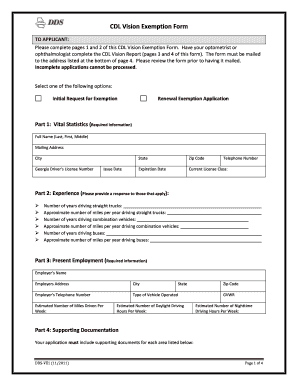
- #FLMCSR MEDICAL FILE DRIVER QUALIFICATION HIPPA DRIVERS#
- #FLMCSR MEDICAL FILE DRIVER QUALIFICATION HIPPA LICENSE#
#FLMCSR MEDICAL FILE DRIVER QUALIFICATION HIPPA LICENSE#
Screening by the DMV for visual acuity is routine, albeit crude, and when required at license renewal, may be associated with decreased fatal crash risk for older drivers. 14 Other ophthalmic conditions which may impair driving ability include myopia, glaucoma, and macular degeneration.
#FLMCSR MEDICAL FILE DRIVER QUALIFICATION HIPPA DRIVERS#
13 In a 5-year, case-controlled study, drivers with cataracts were 2.5 times more likely to be in an at-fault MVA. Visual impairments are associated with MVAs. This information is then reported to the Department of Motor Vehicles (DMV). 11 Since 1988, California physicians have been required to report older persons with Alzheimer's disease and related disorders to their local health departments. 9, 10 A licensing agency assessment using a battery of tests for elderly drivers with dementia or other aging-related medical conditions is currently being field tested. 8 Interactive driving simulators and performance-based road tests can provide an objective measure of driving ability in demented persons. A case-controlled study of MVAs among Alzheimer patients suggested an odds ratio of 7.9. Alzheimer dementia occurs in about 10% of persons over the age of 65 years and in 20% of persons over age 80. 6, 7Īlzheimer dementia is of particular concern for traffic safety given its prevalence and its effect on driving skill. For example, mildly demented drivers who have difficulty performing visuospatial skills such as copying a figure, are more likely to have poor driving skill. Particular features of a condition may be a better index of driving risk. The presence of a condition in and of itself may not correlate with risk. Most conditions that compromise driving safety produce impairment along a continuum, e.g., hearing loss, visual impairment, and cognitive impairment. Patients who may be considered for revocation or limitation of driving privileges include patients with an ongoing or persistent impairment such as visual defects or dementia, or patients with a propensity for episodic disability such as epilepsy, cardiac dysrhythmias, or substance dependency.

Older drivers are more frail and fatality rates per miles driven among drivers over 85 years are 2.5 times that of the youngest drivers. However, younger drivers drive twice the miles as older ones, and absolute numbers indicate that crashes are primarily a young driver problem. 5 For drivers over age 85, crash rates are only 1,500 per 100 million miles compared to 2,000 for drivers ages 15 to 19. Otherwise, the breach of patient confidentiality by physician cannot be justified ethically.Īccording to the National Highway and Transportation Safety Administration (NHTSA), crash involvement rates per miles driven remain low until age 74 and increase sharply thereafter. Furthermore, this disclosure must lead to concrete actions in the interest of public safety. However, this obligation must be in proportion to actual and relative risk and, in order to be just, must cover all disabilities that convey similar public risk. In some situations, physicians have an ethical obligation to the safety and welfare of the community to report such disabilities to the authorities.

The physicians' role often is pivotal in determining physical and mental conditions which may impair a patient's ability to drive.

These losses have profound implications for many patients in terms of emotional and physical well-being, quality of life, and evaluation of self-worth.

Patients who forego driving often lose independence, compromise their ability to work and provide for their dependents, and have difficulty maintaining social contacts, continuing involvement in personal interests, and participating in community activities. However, our society poorly supports individuals who no longer drive. Although driving is formally recognized as a privilege, government-directed programs and other social structures suggest that driving is a near universal and essential function in our society.


 0 kommentar(er)
0 kommentar(er)
